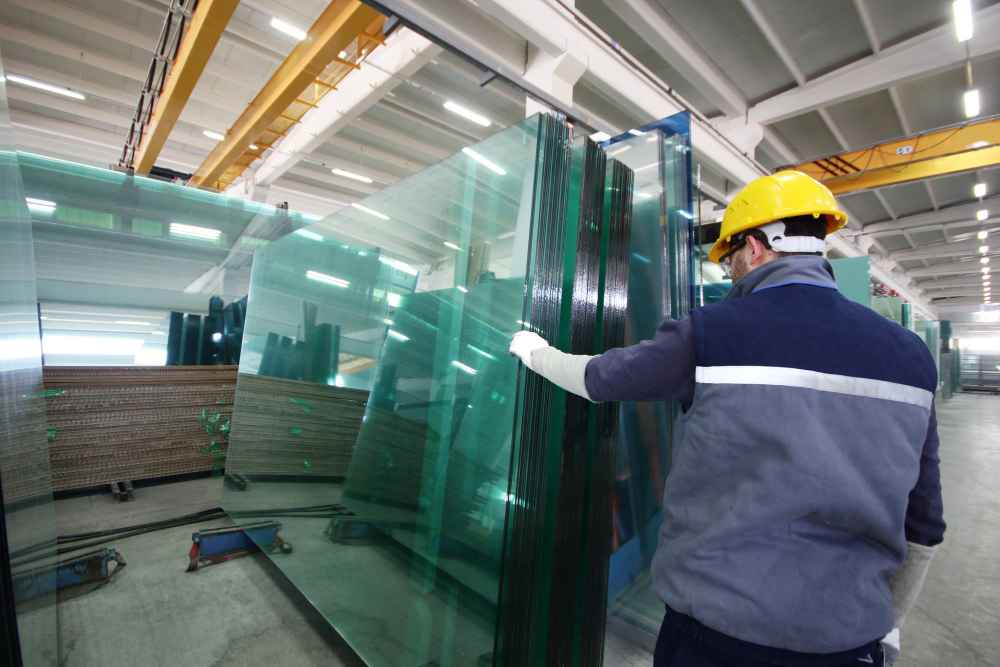What is Glass Industry Software?
Glass industry software is highly versatile Enterprise Resource Planning software that streamlines glass manufacturing operations and provides a single integrated platform and interface to manage all business activities, from the procurement of raw materials to the delivery of finished products. Besides, it optimizes business resources to align with the strategic goals and objectives of the company.
ERP Software helps businesses working in the glass industry plan and schedule production, track production data, manage variables, reduce errors in fabrication work, and complete orders on time with minimal waste. As a result, they get a competitive edge in a highly competitive market today.
Overview of the Glass Industry
The Indian glass industry is a growing sector with an estimated market size of $3.3 Billion as of the financial year 2022, according to a report by International Market Analysis Research and Consulting Group (IMARC Group). It is expected to grow at a Compound Annual Growth Rate (CAGR) of 7.5% during the forecasted 5-year period of 2023–2028.
There is a growing demand for Indian glass in developed and developing countries due to its competitive pricing and higher quality. Domestic glass traders are well-positioned to capitalize on this attractive opportunity. In the domestic scenario, the construction and electronic gadget sectors are the two major sectors driving the growth of the Indian glass industry and creating lucrative growth opportunities. The growing popularity of solar energy in India is also expected to create new demand in the near future and lead to a surge in new employment opportunities.
You May Also Like: 7 Reasons Why ERP Software is important for your business
Challenges Faced by the Glass Industry
-
Increasing Cost of Raw Materials
The glass industry in India is a capital-intensive industry in which raw material prices keep increasing due to growing demand from the construction and automation industries. The shrinking profit margins often force merchants to hike product prices for the final customer.
-
Changing Industry Trends
The glass manufacturing and construction industries are highly interlinked. In recent years, the construction sector has witnessed a sudden shift from the demand for float and pattern glasses to alternate materials such as metal and plastic. The lower demand for certain types of glasses has led to reduced sales, lower revenues, and a higher financial strain on glass traders.
-
Strengthened Govt Regulations
The glass manufacturing process contributes to greenhouse gas emissions and climate change. As a result, the Government of India has strengthened regulations and imposed carbon taxes. It has forced glass fabricators to reconsider their expansion plans due to the increased risk of litigation, higher compliance costs, delays in product development, and reduced innovations.
-
Shortage of Skilled Manpower
The glass industry is labor-intensive. A significant portion of the production process relies on manual labor work than automation. Due to the relatively lower wages, it is not attractive to the young population. As a result, it faces challenges in attracting and retaining skilled laborers and suffers from a lack of innovation & productivity.
-
Transportation Challenges
The glass industry in India is divided among various small and medium-sized glass manufacturers. The lack of dedicated freight corridors, infrastructure facilities, and poor road condition causes congestion, delayed deliveries, damaged goods, accidents, and fatalities. Moreover, the companies suffer from other transportation costs such as tolls, taxes, and increased fuel prices.
-
Intense Competition
The Government has relaxed the regulations for setting up glass manufacturing plants. With the introduction of new domestic and international players, the competition has become intense. International players use modern technologies, to automate various tasks, making it difficult for Indian companies to compete with them. These international players often have more capital due to strong financial backing and global reach. The increased competition has forced domestic players to slash prices, leading to lesser profit margins and financial difficulties.
Future Trends in the Glass Industry
-
Adoption of New Technologies
Globalization and changing consumer expectations have driven significant technological changes in the industry. The introduction of smart glasses and energy-efficiency glasses are some of the recent introductions. While smart glasses offer an Augmented Reality (AR) experience, energy-efficient glasses have a special coating that reduces energy consumption and power bills. Moreover, ERP implementation is another major trend among glass traders for improved visibility, efficiency, and better customer support.
-
Impact-resistant Glasses
These polycarbonate glasses are thinner and lighter than plastic. However, they offer UV protection, shatterproof durability, the ability to withstand impact, and an additional layer of security from potential hazards. They are an optimal choice for kids and active adults.
-
Sustainability
Glass manufacturing is an energy-intensive process that contributes to greenhouse gas emissions, significant waste, and damage to the environment. Glass manufacturers are trying to address this problem by focusing on new types of sustainable glasses that are made up from recycled materials. These glasses are eco-friendly, energy-efficient, and pose minimum harm to the environment during their production. Moreover, some of them are believed to be more durable and have a longer lifespan.
-
Rise of the Solar Glass Market
India is committed to renewable energy sources. India’s solar energy market has experienced remarked growth over the past decade. The need for solar panels has led to a growing demand for high-quality specialized glasses.
-
Glass Fiber
Glass fiber (also known as, fiberglass) is made up of several non-crystalline materials that are extremely fine fibers of glass. It is corrosion-resistant which makes it an attractive choice for the marine and chemical industries. It can withstand high heat which is why it is increasingly used in refrigerators and ovens. Another distinct advantage it holds over other types of glasses is that it is non-conductive material that works as an electrical insulator.
You May Also Like: Top 7 ways to measure your Business Efficiency
Benefits of Using Glass Industry Software
-
Enhanced Agility
Business intelligence tools interconnect all modern business processes for real-time and accurate data sharing. They support industry-specific production processes from recipe management, batching tracking, production planning, historical demand analysis, demand forecasting & production scheduling, inventory management, and financial management. Glass software facilitates quicker decision-making so that businesses can address problems swiftly and promptly respond to changing market trends & consumer behaviors.
-
Electronic Data Transfers with Stakeholders
ERP system offers intelligent software solutions for glass producers that facilitate streamlined electronic data transfers with various stakeholders such as suppliers, carriers, and final customers. It results in real-time exchange of information, accurate data sharing, reduced paperwork, and fosters more responsive and enhanced communication. Effective communication with all stakeholders using ERP for manufacturing industry helps build trust, improve morale, and boost productivity & efficiency.
-
Data Standardization
ERP software centralizes all data into one place in a consistent format and structure, rather than being dispersed across multiple departments in dozens of spreadsheets or databases. It reduces duplicity of information, human errors, and discrepancies caused due to varying data formats and terminologies. The standardized data can be easily aggregated, integrated with Internet of Things (IoT) devices, and analyzed to generate meaningful insights and generate reports.
-
Material Requirement Planning
Material requirement planning is a crucial step that offers multiple advantages such as better recipe management, optimized inventory levels, improved traceability, reduced over-stocking, and under-stocking situations, and timely production activity. ERP software for manufacturing helps the glass manufacturing industry with better material planning to meet changing market demands, and consumer expectations.
-
Order Tracking
In this age of globalization, there is increasing competition, and meeting customer demands on time is essential. Software for managing business makes order tracking simpler from start to finish. It automates shipping label generation, shipment tracking, customer notifications, batch tracking, and other tasks. The automated report generation feature helps reduce delays in shipping, saves time, and helps meet customer demands on time.
-
Retain Customer Contentment
High-quality materials are used to produce superior-quality glasses. The quality assessment tools in glass software enable your business to meet the highest quality standards, keep consistency throughout production, retain customers’ contentment, and meet your corporate objectives. The reduced production defects save money on repairs, replacement, and material costs, and ensure better customer relations.
-
Single Source of Truth
ERP for the glass manufacturing industry maintains the supply, logistics, distribution, and accounting management from one portal. The Sales Module is used for effective lead management, sales forecasting, opportunity management, and order management. The Purchase Order module is used to track order purchases, order requisition, quotation management, and Purchase Order (PO) management. The Warehouse Module is used for extended warehouse management of materials. Accounting Management is used to automatically generate & manage invoices, and ap automation. Furthermore, it can also help with the ar automation, budgeting, and taxation simplifications.
Conclusion
Glass industry software helps glass merchants streamline their industry-specific production processes, enhance the supply chain, manage sales and inventory, and bring visibility into business operations. The decision-makers can make strongly data-backed strategic business decisions that lead to better competitiveness, growth, and sustainability.
Sage X3 is a robust tool that offers state-of-the-art technology to help glass merchants cut production and overhead costs, foster innovation, grow sales, adapt to changing market trends, and achieve long-term value creation, profitability, and strategic business workflow. It’s scalable and customizable so that you can reshape it to your unique needs for faster speed & agility. It offers breakthrough features and a complete solution that help your business seize new opportunities, mitigate risks and improve profitability.






